
Desire, ambition, devotion, and devastating loss are all subjects for Mazur's clear-eyed poems, which resonate with the contradictions between the body's yearning and the mind's acknowledgment of the consequences of our choices. In a poetry driven by unrelenting questioning, Mazur tries, in Rilke's worlds, "to love the questions themselves."
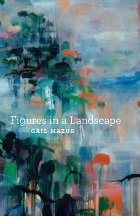
A new inclusiveness, a heady freedom, grounded in the facts of mortality, inform Gail Mazur’s recent poems, as if making them has served as both a bunker and a promontory, a way to survive, and to be exposed to, the profound underlying subject of this book: a husband’s approaching death. The intimate particulars of a shared life are seen from a great height—and then there’s the underlife of the bunker: endurance, holding on, life as uncompromising reality. This new work, possessed by the unique devil-may-care intensity of someone writing at the end of her nerves, makes Figures in a Landscape feel radiant, visionary, and exhilarating, rather than elegiac. Mazur’s masterly fusion of abstraction with the facts of a life creates a coming to terms with what Yeats called “the aboriginal ice.”
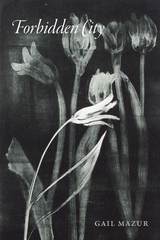
A draughtsman’s draughtsman, Hokusai at 70
thought he’d begun to grasp the structures
of birds and beasts, insects and fish, of the way
plants grow, hoped that by 90 he’d have
penetrated to their essential nature.
And more, by 100, I will have reached the stage
where every dot, every mark I make will be
alive. You always loved that resolve, you’d repeat
joyfully—Hokusai’s utterance of faith
in work’s possibilities, its reward, that,
at 130, he’d perhaps have learned to draw.
Gail Mazur’s poems in Forbidden City build an engaging meditative structure upon the elements of mortality and art, eloquently contemplating the relationship of art and life—and the dynamic possibilities of each in combination. At the collection’s heart is the poet’s long marriage to the artist Michael Mazur (1935–2009). A fascinating range of tone infuses the book—grieving, but clear-eyed rather than lugubrious, sometimes whimsical, even comical, and often exuberant. The note of pleasure, as in an old tradition enriched by transience, runs through the work, even in the final poem, “Grief,” where “our ravenous hold on the world” is a powerful central element.
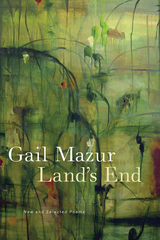
In Land’s End, we see Mazur writing with the kind of lyric authority, ever-deepening emotional range, and intellectual and social scope that her readers have come to expect in her poetry. Beautifully crafted elegies meet with reflections on her own life, her family, and artists who have come and gone. In the title poem, she leads readers through a garden, where new and old growth twists together in an “almanac of inheritances” that conjures the rich memory of poets who have passed on. In this space of remembrance, Mazur also charges us with the responsibility of nurturing art and artists of the future, especially in the face of the disheartening absurdities of contemporary politics. Contemplating the growth and decay so entwined in life, these poems invite us to consider both inevitable brokenness and necessary hope, writing “My work now: to continue learning to absorb the loss, / and live.”
Through tidal creeks and the weightless scenes of ukiyo-e woodcuts, in artists’ studios and along the frozen Charles River, Mazur connects passionately with the world around her. Carrying with her the undeniable presence of loss and of time past, she engages deeply with the present, her historic memory informing a deep concern for contemporary life. Reading Land’s End, we find ourselves with the poet:
together we’d have energies to do battle forever.
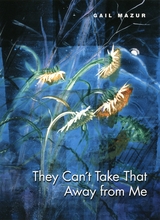
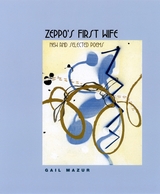
. . . Sad, so sad-compared to what?
To your earlier more oblivious state?
It never was oblivious enough-
always those presentiments of sadness
prickling the limbic. Now a voice says, Get outside
yourself, go walk on the flats. The tide's gone out—
but your little metal detector will detect little metallic coins
of enormous sadness in the teeming wet sand,
and then, the tide will come back, erasing, cleansing!
And you, standing there in the salty scouring air-
will you still be enormously sad,
While the other world, outside your tiny purview, struck
by iron, reels? World of intentional iron, pure savage
organized iron of the world, it hasn't the time
that you have for your puny enormous sadness.
Widely acclaimed for expanding the stylistic boundaries of both the narrative and meditative lyric, Gail Mazur’s poetry crackles with verbal invention as she confronts the inevitable upheavals of a lived life. Zeppo’s First Wife, which includes excerpts from Mazur’s four previous books, as well as twenty-two new poems, is epitomized by the worldly longing of the title poem, with its searching poignancy and comic bravura. Mazur’s explorations of “this fallen world, this loony world” are deeply moving acts of empathy by a singular moral sensibility—evident from the earliest poem included here, the much-anthologized “Baseball,” a stunning bird’s-eye view of human foibles and passions. Clear-eyed, full of paradoxical griefs and appetites, her poems brave the most urgent subjects—from the fraught luscious Eden of the ballpark, to the fragility of our closest human ties, to the implications for America in a world where power and war are cataclysmic for the strong as well as the weak.
READERS
Browse our collection.
PUBLISHERS
See BiblioVault's publisher services.
STUDENT SERVICES
Files for college accessibility offices.
UChicago Accessibility Resources
home | accessibility | search | about | contact us
BiblioVault ® 2001 - 2024
The University of Chicago Press









